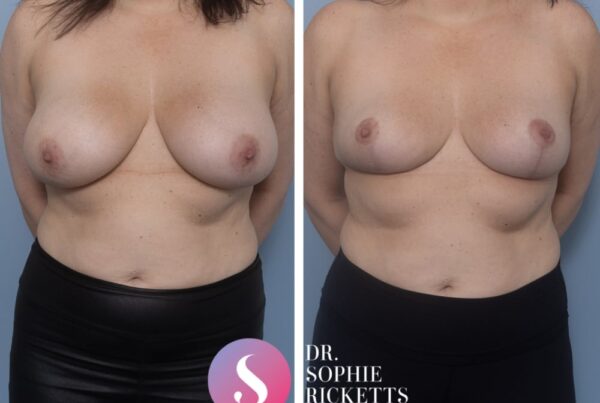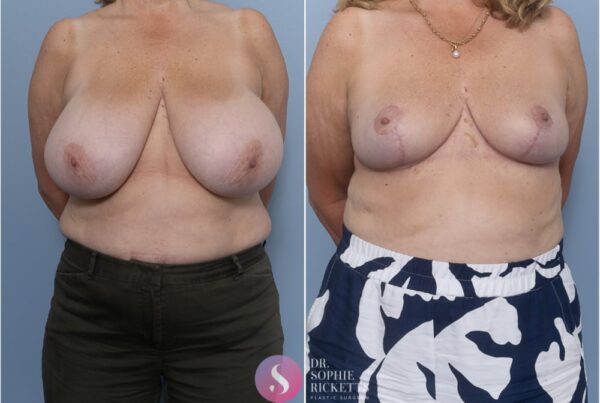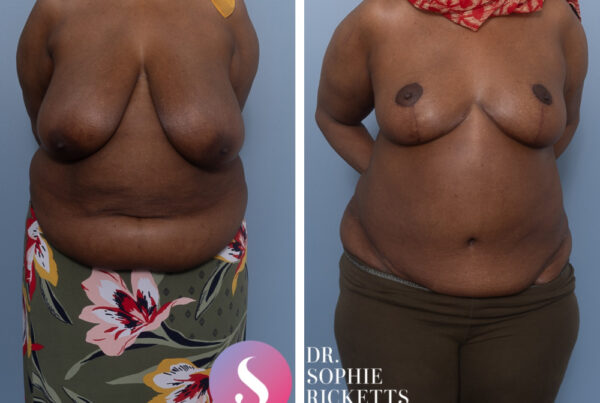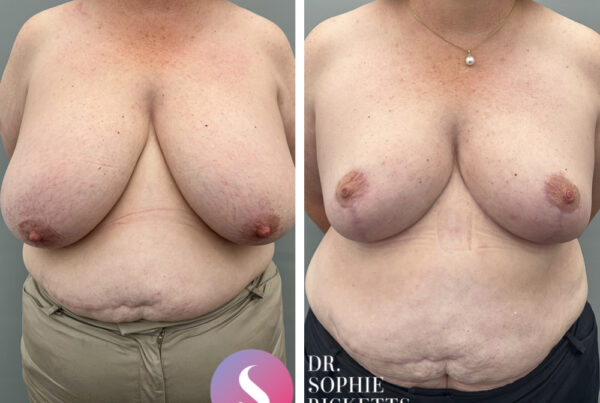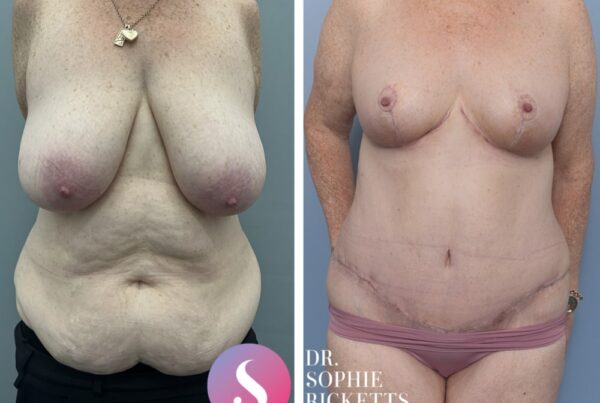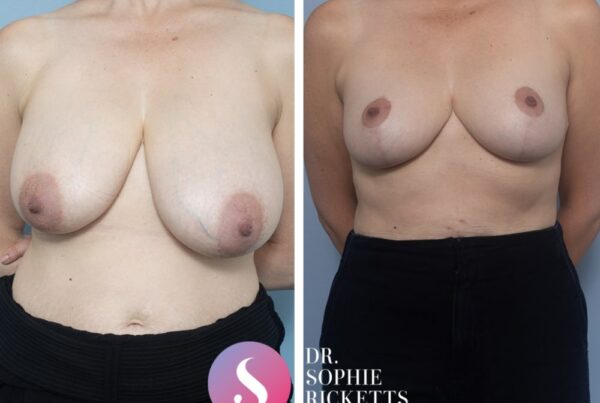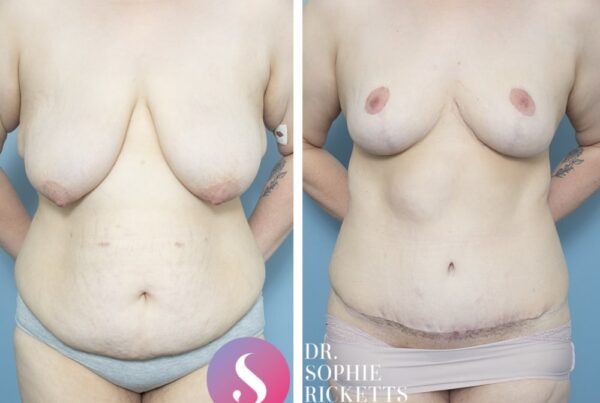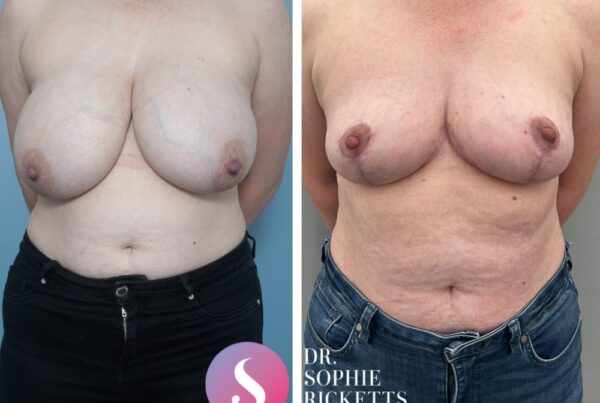Why might breast reduction surgery be considered?
Breast reduction surgery is a procedure that reduces the size and weight of the breasts. Some people seek advice about this surgery because of physical symptoms such as neck or shoulder discomfort, shoulder grooves from bra straps, rashes under the breast fold, or difficulties with certain activities.
Suitability for surgery depends on factors including overall health, medical history, and individual anatomy. In a consultation, Dr Sophie will discuss your individual circumstances, outline potential risks and alternatives, and advise whether a breast reduction procedure may be appropriate for you.
What is the down-time?
The hospital stay is usually just one night. Recovery is around two to three weeks. Return to full, high impact exercise is six weeks but less vigorous exercise can commence well before that.
Can I breast feed after breast reduction?
Generally yes, you will still have milk producing glands that function and open into the nipple. The amount of breast that you have after the surgery is less though, and you should expect to have to supplement your breast milk to sustain your baby.
Will my nipples still have feeling after surgery?
There is frequently some decrease in nipple sensation after breast reduction. This is highly variable however. Some women feel no change in the feeling, some lose some feeling and others have increased feeling. It is rare to lose feeling completely.
Frequently Asked Questions
Will my scars be noticeable?
Your scars will be either a “lollipop” or “anchor” shape on the breasts and although often quite pink in colour for the first few months, will fade over time. Full scar ‘maturation’ happens over about a year. Dr Ricketts’ aftercare instructions will help a lot —such as keeping the scars taped for the first 6 weeks to avoid widening of the scar, then using moisturising creams to keep the scar hydrated, avoiding sun exposure. Sometimes specific scar treatments such as silicone gel or tape will be recommended and can help reduce their appearance. Over time, most scars will soften and become less noticeable. If you have concerns, Dr Ricketts can discuss additional options, such as laser treatments or topical solutions, to further improve scar healing and appearance.
How long does the surgery take?
Breast reduction surgery usually takes between 2 to 4 hours, depending on the complexity of the procedure. Dr Sophie Ricketts plans each step meticulously to prioritise safety and outcomes. Factors like breast size, surgical technique, and whether additional procedures are included can influence the duration. After surgery, you’ll be monitored in recovery for a few hours before going home or staying overnight if needed. Your care will be personalised to support your recovery from the beginning.
What is breast reduction surgery?
Breast reduction is a surgical procedure that removes excess breast tissue and skin to reduce breast size and improve physical comfort. It is often chosen by women experiencing neck, back, or shoulder discomfort. Dr Sophie Ricketts, a highly experienced female plastic surgeon, performs this surgery with a focus on individual needs and outcomes. You can view breast reduction before and after examples and breast reduction photos to understand the results. Among plastic surgeons in Melbourne Victoria, she is known for her detailed approach and patient care. If you’re exploring your options with a breast reduction, consulting Dr Sophie Ricketts may be a good next step.
What kind of postoperative care will I need?
After breast reduction surgery, you will need to follow specific postoperative care instructions to ensure proper healing. This includes keeping the surgical sites clean and dry, managing pain with prescribed medications, and limiting physical activity and heavy lifting for several weeks. Wearing any recommended support garments and attending follow-up appointments with Dr Ricketts is crucial for monitoring your progress. Watch for signs of complications, such as infection, and contact your surgeon if any unusual symptoms arise. Proper care also involves avoiding soaking the incisions in water and using treatments to minimise scarring once healed. Following these guidelines will promote a fast recovery and optimal results.
After breast reduction surgery, you will need to follow specific postoperative care instructions to ensure proper healing. This includes keeping the surgical sites clean and dry, managing pain with prescribed medications, and limiting physical activity and heavy lifting for several weeks. Wearing any recommended support garments and attending follow-up appointments with Dr Ricketts is crucial for monitoring your progress. Watch for signs of complications, such as infection, and contact your surgeon if any unusual symptoms arise. Proper care also involves avoiding soaking the incisions in water and using treatments to minimise scarring once healed. Following these guidelines will promote a fast recovery and optimal results.
How do I prepare for breast reduction surgery?
Preparation involves a thorough consultation with your surgeon, where your health, objectives, and medical history are discussed. Dr Sophie Ricketts, a specialist in breast surgery, advises avoiding smoking, certain medications, and herbal supplements that could increase bleeding risks. Arrange time off work, set up your home for recovery, and organise someone to drive you afterwards. You may also need to complete pre-operative tests. Following all pre-surgery instructions carefully can help ensure a safer and smoother experience.
SectionAm I a candidate for breast reduction surgery?
You may be a candidate for breast reduction surgery if you experience persistent physical discomfort such as neck, back, or shoulder pain due to the weight of your breasts, or if you struggle with functional limitations like difficulty engaging in physical activities and finding well-fitting clothing. Good overall health and a recommendation from a healthcare provider are also important factors to consider. Consulting with Dr Ricketts can help determine if breast reduction surgery is right for you.
What can I expect during the breast reduction surgery?
Breast reduction surgery, or reduction mammoplasty, involves removing excess breast tissue, fat, and skin to attain a smaller, more balanced breast size and shape. The procedure typically begins with general or local anaesthesia, followed by incisions around the areola or along the breast crease. Excess tissue is removed, and the remaining tissue is reshaped. Post-surgery, you’ll wear a support bra and follow specific care instructions to manage pain and support healing. Recovery usually involves limiting physical activity, with follow-up appointments to monitor progress and ensure optimal results. Full results become more visible as swelling subsides over weeks to months.
Can I combine breast reduction with other procedures?
Yes, breast reduction can be combined with other complementary procedures, such as abdominoplasty, for more comprehensive results. Dr Sophie Ricketts also frequently performs other combination surgeries to minimise overall recovery time. During a consultation always mention any other potential procedures you wish to discuss as Dr Ricketts will assess your
objectives and determine the most suitable approach. Combining procedures can be an efficient way to attain your desired look within a single recovery period. To learn more about your options and whether a combined procedure is right for you, schedule a consultation with Dr Ricketts.
Will private health insurance cover my breast reduction?
Breast reduction is not generally considered a cosmetic procedure and it is almost always for medical reasons. Private health insurance will often therefore provide a rebate for the surgery and anaesthesia and cover hospital and operating theatre costs. The medical reasons may include the symptoms you are experiencing, like chronic pain, back issues, or skin irritation. Dr Sophie Ricketts’ Team will provide you with all the information that you need to check with your health fund what the level of cover is for your procedure.
